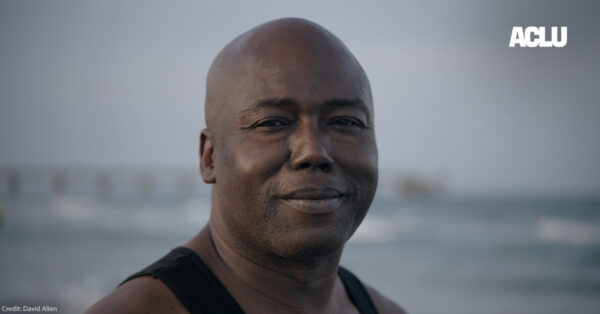
Can Commuting the Row Be Biden's Real Legacy? Herman Lindsey and Cassy Stubbs Discuss With W. Kamau Bell
December 20, 2024
You may recognize W. Kamau Bell from his multi-Emmy award-winning docuseries United Shades of America, or from his Substack Who’s With Me, or from his commercials for the ACLU. If you're a long-time ACLU supporter, you'll know Bell has worked with us for more than a decade as our artist ambassador for racial justice. We're excited to have him as our interim host for our At Liberty podcast, where he will host conversations with leaders, legal experts, artists, and storytellers dedicated to the fight for civil rights and civil liberties.
In this episode, Kamau delves into fundamental flaws with the death penalty, with Herman Lindsey, an exoneree who spent three years on death row for a crime he didn't commit, and Cassy Stubbs, director of the ACLU's Capital Punishment Project. Through Lindsey's powerful first-hand account of being wrongfully convicted and sentenced to death, and Cassy's expertise representing people on death rows across the country, they unpack why the death penalty is broken from start to finish, doesn't keep us safe, and magnifies racial discrimination. With President Biden's term coming to a close and President-elect Trump threatening to accelerate federal executions and expand the death penalty, Cassy and Kamau discuss Biden's critical chance to commute the sentences of all 40 people currently on federal death row and walk us through what we can do to help make it happen.
In this episode
This Episode Covers the Following Issues
Related Content
- News & CommentaryApr 2025

Capital Punishment
Death Row Case Exposes Failures To Protect Childhood Trauma Survivors. Explore News & Commentary.Death Row Case Exposes Failures to Protect Childhood Trauma Survivors
Mikal Mahdi’s life was marked by abuse. Today, as he awaits execution, the courts have the responsibility to acknowledge the systemic failures that shaped his path.By: Megan Byrne, Elisa Epstein - Florida Supreme CourtDec 2024

Capital Punishment
Michael Jackson V. State Of Florida. Explore Case.Michael Jackson v. State of Florida
This case gets at the very heart of our right to a jury trial. Traditionally and historically, the right to a jury trial has promised that a person could not be punished unless every single person in a group of one’s peers agreed, by jury vote, that that was the just outcome. However, Florida feels differently. When it comes to the death penalty, Florida is one of only two states that has decided that the “right to a trial by jury” does not guarantee that a person will be sentenced to death by a unanimous jury. Instead, in Florida, a person can be sentenced to die even if four people on their jury think they should live. The state requires just eight of twelve jury votes for a death sentence, which not only disproportionately affects people of color, but the very ideals at the heart of the rights of citizenship.Status: Ongoing - Press ReleaseFeb 2025

Capital Punishment
Aclu Responds To Supreme Court Decision In Glossip V. Oklahoma. Explore Press Release.ACLU Responds to Supreme Court Decision in Glossip v. Oklahoma
WASHINGTON – In a major win for due process, the U.S. Supreme Court today granted Richard Glossip, a man on Oklahoma’s death row, a new trial and a chance to be fully exonerated. Richard Glossip was convicted in 1998 and sentenced to death for allegedly asking Justin Sneed – the prosecution’s star witness – to murder another man. Sneed's testimony was the only direct evidence connecting Glossip to the murder, and Glossip maintained his innocence throughout. His conviction was overturned by the Oklahoma Court of Criminal Appeals but, despite inconsistent testimony from Sneed at retrial, Glossip was convicted again. It was only then, after two trials and two appeals, that an independent investigation revealed that the prosecution had deliberately destroyed key evidence and additional potentially exculpatory and impeachment evidence was made available to the defense. Those files revealed that Sneed lied at trial about facts that cast his entire testimony into doubt. Despite these new revelations about prosecutorial misconduct, Glossip unsuccessfully sought post-conviction relief, until the Supreme Court last year stayed his execution and agreed to hear the case. “Richard Glossip has been fighting for two decades to prove his innocence; today the Supreme Court assured that he will finally have his day in court,” said Brian Stull, deputy director of the ACLU’s Capital Punishment Project. “Today’s decision reveals the error-prone and arbitrary nature of the death penalty, and the devastating impact of false testimony and wrongfully withheld evidence. Even after it became clear that prosecutors had buried exculpatory evidence, the machinery of the death penalty continued to grind on for years. This case shows that we cannot trust the state convict and imprison only the innocent, let alone to ensure that innocent people are never strapped to the execution table. It is long past time to end the death penalty in our country.” The American Civil Liberties Union filed an amicus brief in the case, arguing that prosecutors violated Glossip’s due process rights by failing to disclose exculpatory evidence and using Sneed’s false testimony to convict Glossip. The brief further highlights Oklahoma’s sordid history of violating these rights. “Time after time, Oklahoma prosecutors have violated these precedents, despite repeated notice that their actions were not in compliance with the U.S. Constitution,” the brief reads. This glaring pattern of errors almost led to the execution of an innocent person. It teaches that the government cannot be trusted to reliably, fairly, and equitably determine who should live and who should die. Glossip v. Oklahoma is part of the ACLU's Joan and Irwin Jacobs Supreme Court Docket.Court Case: Glossip v. OklahomaAffiliate: Oklahoma - Press ReleaseFeb 2025

Capital Punishment
North Carolina Judge Finds Racial Bias In Death Penalty In Landmark Case. Explore Press Release.North Carolina Judge Finds Racial Bias in Death Penalty in Landmark Case
RALEIGH, N.C. – In a landmark case, a North Carolina judge ruled today that race played an impermissible role in jury selection for Hasson Bacote, a Black man who challenged his death sentence under the North Carolina Racial Justice Act (RJA). The court found evidence of discrimination in Bacote’s case, the cases prosecuted by North Carolina Assistant District Attorney Greg Butler, as well as in Johnston County and District 11, relying upon statistical, cultural, historical, and social science, in addition to court files and records. Consistent with prior case law, he ruled that the RJA does not require defendants to make a showing of discrimination in their own case but found that Bacote did prove discrimination in his case. “This decision provides more definitive proof that capital prosecutions in North Carolina are tainted with racial bias and discrimination,” said Cassandra Stubbs, director of the American Civil Liberties Union’s Capital Punishment Project. “What we saw in Mr. Bacote’s case is that the more we look for evidence of discrimination in our state’s capital jury selection system, the more we find. This ruling creates a path to justice for the hundred plus individuals who have filed claims and whose cases were similarly tainted with bias.” In his ruling, Superior Court Judge Wayland J. Sermons Jr. found that prosecutors deliberately struck Black jurors from jury service in Bacote’s case at three times the rate of white jurors. In his findings of discrimination, the judge also cited the prosecutor’s references to thinly veiled racist phrases to refer to Black defendants, like “thug,” “piece of trash,” and “predators of the African plain.” “I am deeply grateful to my family, my lawyers, the experts, and to everyone who fought for justice — not just in my case, but for so many others,” said Hasson Bacote, petitioner. “I want to thank Bryan Stevenson in particular for showing how unfair the jury selection was in my case. When my death sentence was commuted by Governor Cooper, I felt enormous relief that the burden of the death penalty — and all of the stress and anxiety that go with it — were lifted off my shoulders. I am grateful to the court for having the courage to recognize that racial bias affected my case and so many others. I remain hopeful that the fight for truth and justice will not stop here.” The judge’s ruling set out guidance and made important fact findings that could pave the way for others on death row with RJA claims to successfully challenge their death sentences. On Dec. 31, 2024, former Gov. Cooper commuted the sentences of 15 people on death row, including Hasson Bacote. Even though Bacote was already resentenced to life without parole, the judge issued a ruling in his case because of its importance for the 100-plus people with pending RJA claims. “Racial discrimination in our courts and criminal legal system has long impacted death penalty sentencing,” said Ashley Burrell, senior counsel at the Legal Defense Fund. “Today’s ruling affirms what we have argued all along: racism infects the death penalty. We are hopeful that future decisions will result in relief under the RJA for other North Carolinians currently on death row.” The North Carolina Racial Justice Act was a novel piece of legislation passed in 2009 that allowed people to challenge their death sentences if they could show race played a role in their trials. Those who prove racism stand to be resentenced to life without parole. Four individuals won their claims at a hearing in 2012 in Cumberland County and were resentenced to life without parole. The decisions in those cases were ultimately vacated in order to give the state more time to prepare its defense to the sweeping charges of statewide bias, although their life sentences were protected by double jeopardy. The state legislature repealed the statute in 2013, but after a legal challenge, the North Carolina Supreme Court ruled in 2020 that those who had already filed claims under the RJA were entitled to hearings. Bacote’s case was the first to move forward since the Supreme Court ruling and is the first North Carolina case where a trial court ordered statewide discovery of prosecution notes from jury selection in all capital trials since 1980. “The sweeping evidence of discrimination in jury selection and the definitive conclusions by Judge Sermons vindicate the legislature’s decision to enact the Racial justice Act in 2009,” said Gretchen M. Engel, executive director of the Center for Death Penalty Litigation. “The ruling creates an opportunity for leaders in North Carolina to turn the page on this shameful chapter for our state. At a minimum, Governor Stein and Attorney General Jackson should commit to addressing the failures of the criminal legal system and adopt policies that prevent this kind of discrimination in future death penalty cases.” Bacote is represented by the ACLU Capital Punishment Project, the ACLU of North Carolina, the Legal Defense Fund, the Center for Death Penalty Litigation, and attorneys Jay Ferguson and Henderson Hill.Court Case: North Carolina Racial Justice Act Litigation (North Carolina v. Hasson Bacote)Affiliate: North Carolina


